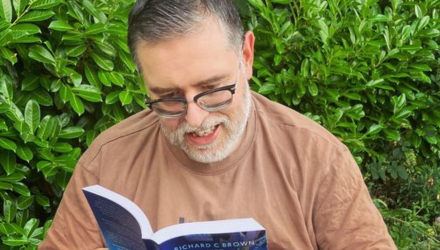Name: Richard Brown
Please share any updates since your last interview: In the past 2 and a half years, I have published a book — Disability is Other People: My Superhero Story.
What do you want to discuss? Is there some background to cover? The book is my memoir. It is not about me becoming a superhero, but about all the superheroes that I met and learned from along the way.
It follows my story through childhood and diagnosis, struggling to find myself as a teenager. As with all great stories, everything changes when I fall in love! I study at the University of Rhode Island in the fall of 2001. Changed forever, I made it home and I embarked on a fulfilling career and became a parent. Another twist comes when I retire at 35. I suddenly realize that I have spent years taking boxes — but where are mine? It’s voluntary work that helps me now. A school governor, a museum curator, a director of the community bus company, a reader with school pupils – and of course working with Ataxia UK. As each opportunity takes me further, I realize it is volunteering that brings real fulfillment in life.
The lockdown changed everything and everyone once again. The chance to reflect, that’s really where this book came from.
When did you start your book? From start to finish, the process took about 18 months. Towards the end of 2022, I realized I had gathered a fair amount of experience in life and disabilities, that I had been sharing through my blog. I had recently finished my eight years as a trustee of Ataxia UK and so I had some extra time. I had just received an MBE (the first person with FA to do so), and that was a prompt to look back and tell my story. I could see the narrative structure already beginning to emerge.
What made you choose this? This process, looking very hard at yourself was therapeutic! There are not enough disabled voices out there so I felt encouraged by other disabled people. Plus, 35 years is a long time to live with ataxia, and it was time to give something back!
Does FA impact this? Please share any adaptations you’ve made to be able to participate in self-publishing and writing a book. Much of the book was written with the aid of text-to-speech software. When I had the final draft proofread, it highlighted a lot of punctuation errors. When you are dictating to my computer, you have to say the punctuation! It’s a bit unnatural, but you get used to it! To get the book ready for printing, I had to read the text closely about six or seven times to spot printing errors or typos.
Do you have anything more to share/advice to give?? I finish the book with my advice on how to live with a disability. I really want to help people understand where ideas of disability actually come from, and how much we have in common with other groups fighting for equality. It is so important not to let other people tell us what we should or can’t do.
Interview by
Brittany Sommerfield
